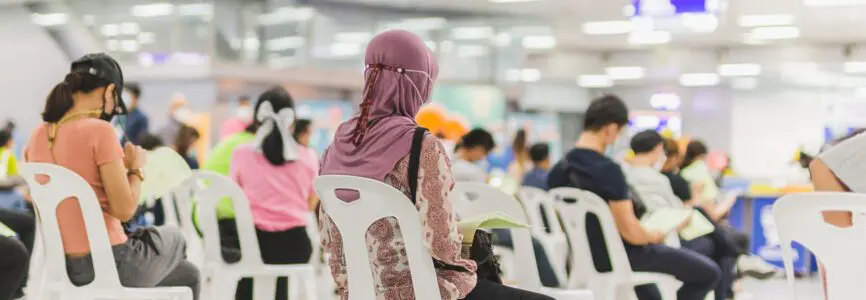Bioethics Forum Essay
Overcoming Covid Vaccine Hesitancy Among Minnesota’s Somali Muslims
When Covid-19 vaccines first became available last year, Minnesota’s Somalis were fearful and, consequently, their vaccination rate was low and their Covid-19 rate was high. But health professionals and community representatives worked together to understand and overcome their vaccine hesitancy.
Minnesota has the largest population of Somali Muslims in North America. Their vaccine hesitancy can be understood from a religious and cultural perspective. The Muslim faith is the center of everyday life for many Somali families. In the initial phase of vaccine rollout, Somali Muslims were concerned about vaccines derived from materials prohibited by Islamic law (pork and fetal cells). This concern was dispelled by fatwas, rulings or statements by Islamic legal authorities, supporting Covid-19 vaccines and by the manufacturers of vaccines themselves.
So, why did Somali Muslims remain hesitant to get vaccinated? The main factor was mistrust in government related to their refugee and immigrant status, past traumas, and experiences with racism. Many Somali Muslims thought the Covid-19 vaccine was being used to experiment on them, as in the Tuskegee syphilis study, because they are immigrants and part of the Black community. While such misinformation is spread online and on social media, it spreads even more during the discussions between friends and family members since Somalis place a lot of trust in word-of-mouth information. There were misinformation campaigns about Covid-19 pandemic specifically targeted the Somali community that took advantage of their mistrust in public authorities and misconception about Covid vaccines.
Other factors also contributed to vaccine hesitancy. Only 20% of the 78,846 Somalis in Minnesota speak English. The language barrier and lack of health literacy add to Somalis’ vulnerability to misinformation and miscommunication about vaccination.
Health professionals and community representatives in Minnesota have taken several steps to reduce Covid-19 vaccine hesitancy in the Somali Muslim community. They are using culturally relevant information and trusted messengers to educate people and dispel false information. With the help of local organizations, the state government has organized information campaigns and provided translational assistance. Health care facilities have increased the number of interpreters to translate medical information, including interpreters who know less common Somali dialects. The Sahan Journal, a trusted St. Paul-based publication for immigrant communities, published helpful FAQ’s that provided practical information on vaccines, including where and how to get them, and dismissed rumors that the shots contained pork or other products not considered halal.
As a faith-based approach is effective for reaching for Somali families, M Health Fairview, a Minnesota hospital system, produced YouTube videos on vaccination featuring Muslim religious and community leaders. Imams are using various ways to address safety concerns and boost the confidence of Somali community in Covid-19 vaccines. They are using their platforms during Friday sermons to correct misconceptions, such as that getting vaccinated during Ramadan would break the fast. In the initial phase of vaccine roll out, several Minnesota imams gathered at a health facility in Minneapolis and got vaccinated on camera for multiple Somali language media outlets.
The Minnesota health department has partnered with Somali Community Resettlement Service in Minneapolis to create and share culturally appropriate messages in the Somali language. To overcome access barriers, the Minnesota health department joined forces with the Minneapolis Public Housing Authority to identify public housing residents who could benefit from at-home COVID-19 vaccinations. In addition, the health department partnered with Hennepin Healthcare, a local health care network, to have nurses visit these residents, answer their questions and concerns, and offer vaccination. M Health Fairview has also hosted mobile vaccination events through Minnesota Immunization Networking Initiative.
Cultural sensitivity is a building block of trust. While there was much fear in Minnesota’s Somali Muslim community at the beginning of the pandemic, after hearing message from trusted figures like imams and other community members, more Somali Muslims are now opting to get the shot. Vaccination rates among Black people over age 5 in Minnesota (80% of whom are Somalis) rose from just 38% last March to 65% today. As mistrust and fear of vaccination is prevalent in all immigrant communities, tools like those used in Minnesota can be helpful in addressing vaccine hesitancy elsewhere, and preventing Covid-19 pandemic from becoming endemic.
Asma Fazal, MD, MRCPI, MHSc, HEC-C, (@AsmaaFazal) is clinical ethics fellow at Children’s Minnesota.














The statistic that only 20% of Somali Minnesotans speak English is a misinterpretation from the source provided. The table at the link states that 20% of Somali Minnesotans age 5+ DO NOT speak English well or at all. Which means 80% of them speak English at least at a level considered “well”. I know this article is a couple years old but it should still be corrected.